18 months ago, we started working on the production of our first independent video game, Bury me, my Love. If you haven’t heard of it, it’s a text-message based interactive fiction that tells the story of Nour, a Syrian woman who decides to leave her war-torn country. She wants to reach Germany, and she has to make this dangerous journey alone as her husband Majd cannot come with her. You play as Majd (even though he, as a character, has his own personality), and you have to provide Nour with advice and support, all this through text messages, selfies and emojis only. This is what I call a reality-inspired game, a fiction directly derived from real events – and, in this case, from interfaces we’re used to using.
Bury me, my Love’s production was sometimes easy, sometimes a complete mess. We made mistakes, overlooked things, and learned a lot. So I figured I’d share our experience, as it might be useful to others – keep in mind it was our first project as indie devs.
There’s just one thing you should know before I start. In the game, almost every decision you make may have an impact on one (or more) of the three variables that define Nour’s state: her romantic relationship with Majd, her money and her morale. For this piece, I’ll leave money and love out of the equation (they could be the subject of two separate articles) and focus on morale only. Let’s say I start with a good 60 morale points - as Nour does in the game. Here we go.
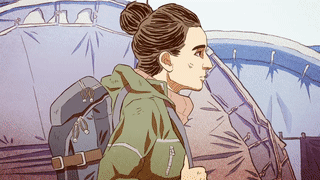
June 2016.
After reading a very touching article in Le Monde (The Journey of a Syrian Migrant as told by her WhatsApp conversations), I decide to make a game about how migrants communicate with their loved ones when they’re on the road. But obviously, I won’t be able to tackle such a delicate topic without getting help from people who know the situation very well. So I get in touch with Le Monde’s journalist, Lucie Soullier. Lucie is not at all familiar with video games, but after I explain what I have in mind in detail she agrees to introduce me (via WhatsApp) to Dana, the Syrian woman from the article. Dana is immediately enthusiastic: she thinks a game could be a great medium to tell the stories of people like her. Lucie and Dana accept to be part of our editorial team, and I feel that with their help we’ll be able to write a believable story.
~morale = morale+5
I get in touch with people I know to ask them whether they’d like to join in. Pierre Corbinais’ a great writer, he knows how to write dialogs that feel genuine and he’s a former journalist, which is important for this game’s topic. Paul Joannon’s got XP in game development and worked at French newspaper Libération until he decided to quit, quite recently. For the interface design, I’d like to find people who worked on apps before in order to get a WhatsApp look, and I know just the right team for that: Figs. And the artist, Matthieu Godet, has worked with Paul before, which is definitely a good thing.
To my delight, everybody likes the project and wants to be a part of it. Even better: Figs are OK to co-produce it!
~morale = morale+5
July 2016
Figs and TPH have some money to invest in the game, but that won’t be enough, so I have to find more elsewhere. There’s this thing in France, the Centre National du Cinéma’s Fonds d’Aide au Jeu Vidéo (Video Games Help Fund). It gives grants to innovative projects, so we apply. The required presentation is a good opportunity to have a clearer project: we define the story, the game design, the tools we’ll be using, make a budget & market analysis... But I have to finish the application during a weekend that I had planned to spend with old friends. As I struggle with a weak Internet connection I hear them eating homemade burgers and drinking cold beers without me. Worth it, but still a bit sad.
~morale = morale-1
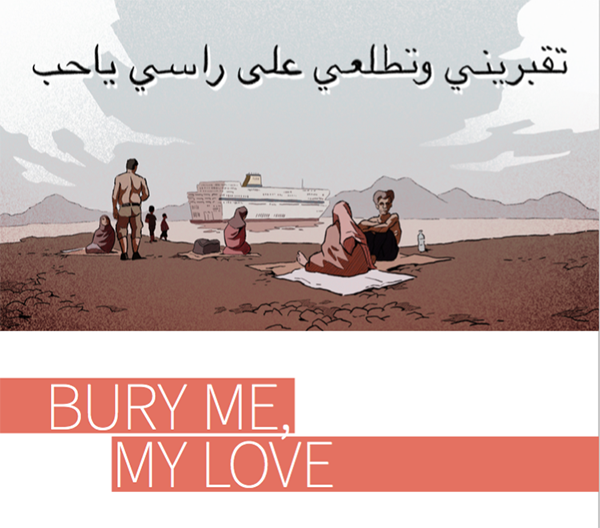
The cover to our very first presentation of the game
August 2016
Since June, Pierre and I have been gathering documentation and reading a lot of testimonies by migrants who undertook the journey between Syria and Europe. I had read things on the subject before, but digging into it makes me realize how bad the situation is. This is intense, and it also makes me question my position in the project. As a healthy European, living a fairly comfortable life, is it really my place to make this game?
That’s the thing with reality-inspired games: they basically require you to talk about other people’s lives. But as a former journalist, I’m familiar with the process. I’ve learned the importance of finding the right distance with your subject. We’re not superheroes with capes, we don’t have the pretension to come to the rescue and save migrants from a gloomy fate. Nor are we an NGO with an activist’s agenda. We just want to tell those stories in the form of a video game, for players to acknowledge them and what they say about the world we live in.
As neither Pierre nor I are Syrian refugees, Nour and Majd’s story is going to be a fiction. But to work as a reality-inspired game, it needs to be as truthful and believable as possible. There’s a lot of work ahead to achieve that.
~morale = morale-3
September 2016
We got money from the French CNC! They seem to have liked the project and decided to help us. That’s a good thing because now I know we’ve got enough money to make Bury me, my Love happen. Of course we’re on a tight budget, and we may have to cut out some of the features we’d like to have during the development process, but still. And now that we’ve got the CNC’s support, we might be able to convince other partners to join in. I immediately think about ARTE, the European TV Channel. They’ve been investing in games recently, and BMML seems like a perfect fit for them, so I send them the project.
~morale = morale+4
I have a series of WhatsApp chats with Dana. The things she went through, both before living Syria and during her journey, are really chilling. Yet, she never complains. She just states the facts and how she faced them. I’m really impressed by her, and I start writing Nour as a character with her in mind. I also ask Dana about how life in Germany is. “The people here are really great”, she tells me, “they treat me nicely. But I’ll never be fully happy, until I know my mother is safe.” Her mother still lives in Syria.
~morale = morale-4
October 2016
Both Pierre and I start writing the game. First, we make a map of all the main routes migrants may take between Syria and Europe. We’d like to give players the possibility to explore both the northern (Turkey -> Greece -> western Europe) and southern (Egypt -> Libya -> Italy) routes, but we soon realize that would be too huge a task. So we stick with around 50 locations that appear to be the most visited ones (the northern route, mainly), and trace the actual paths that link them together. This mapping is going to be our guide for the whole writing period. There’s a slight feeling of incompletion to it, though, as I’d really love to use all the material we gathered and tell as many stories as possible.
~morale = morale-2
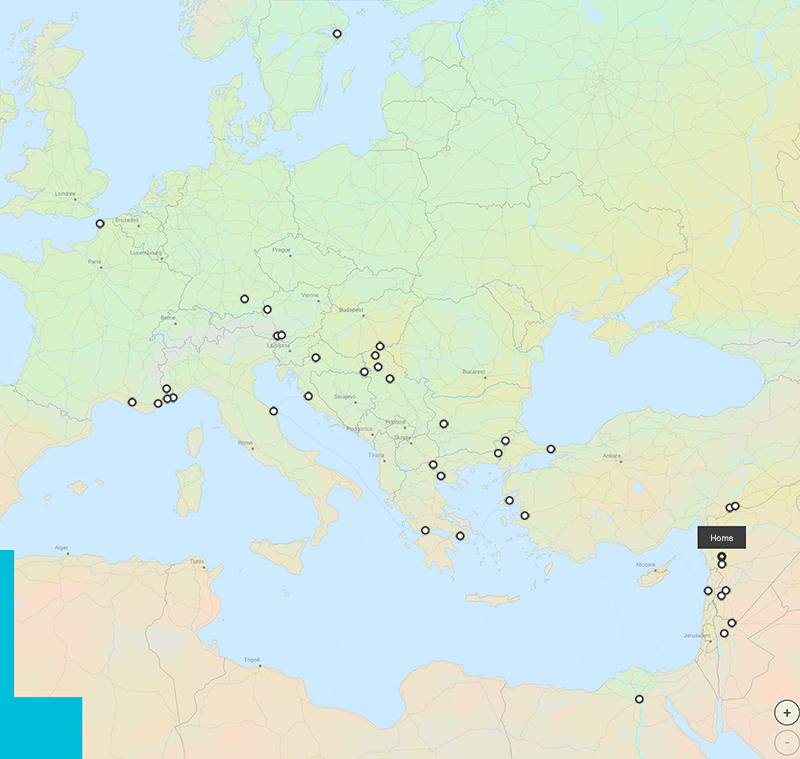
In a typical playthrough, you'll only see 15 to 20 of those places.
Paul, our main developer, is a huge open source fan, and he convinces me that using Unity (like everyone does) might, in the long run, do more harm than good to the ecosystem – after all, having one big player in a monopolistic position is never a good thing. So we review the open source cross-platform engines that are available and finally pick MonoGame. This will make the project slightly more complicated, we’re aware of that, but we take pride in staying true to our convictions (this will prove 100% foolish, as you’ll discover later J). Thanks to the awesome folks at Inkle, we opt for Ink as an open source scripting language, and even our git client is open. How cool is that?
~morale = morale+2
November 2016
Development starts. We’re officially MAKING A GAME!!! Let’s try our best.
~morale = morale+5
December 2016
We’ve got an early prototype! There’s just a fraction of the content in it, and it only has the core features (messages and images display + phone notifications), but it works! The feeling is amazing, and this really confirms my intuition that text-message based storytelling is something quite powerful. I already feel like I’m talking to Nour.
~morale = morale+5
We get two setbacks in a row. The first one comes from publisher Devolver. We contacted them because we thought they might be crazy enough to publish BMML. We were wrong. Then again, our hopes weren’t that high.
A bigger blow comes from ARTE, though. Since we had sent them the project, I grew pretty confident that they’d be interested in it, and willing to start a coproduction. This would be super cool, of course, as we run on a very tight budget, even with the FAJV grant. Think about all we could do with more money! Sadly, most of the folks at ARTE don’t seem to be convinced. It’s not a blunt “no”, but… it’s not very far from it. They’ve got their doubts about our ability to find the right distance to the topic at stake. I think we’re able to do this Right, but quickly run out of arguments. So as a last resort, I ask the ARTE team to test our prototype during the holidays – but I have the feeling it won’t make a significant difference…
~morale = morale-6
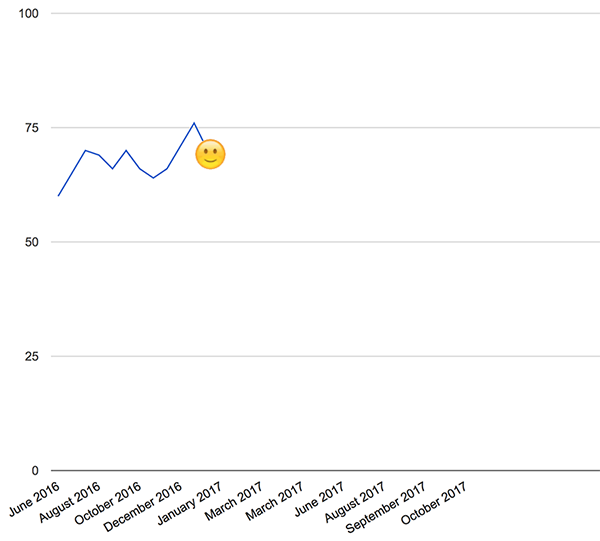
Sure, there's bumps in the road, but until now, morale is good
January 2017
…and I was so very mistaken! In the first days of 2017, I get a call from ARTE. They played the prototype, they really liked it and all their editorial doubts vanished! I had been told before that having a prototype was important, but I did not realize how true that was. Yet the cat’s not in the bag: they still have to undergo a complicated, multi-step internal validation process, and things could still very much go sideways. So let’s hold our horses there.
~morale = morale+5
A woman I’m in contact with for the project invites me to come have a look where she works. She’s volunteering at the migrants’ orientation center in La Chapelle, northern Paris. The situation is complicated, to say the least. There’s far more applicants that there is room, people queue to get food or clothes, fleas are a real issue and the general mood is quite tense. In the past few days, there have been fights, and some dudes even ripped small trees off to use them as clubs!
I realize something important during this visit. The fact is, migrants are held to a very high standard. They have lost everything, risked their lives, may not ever see their families again… and yet they are requested to stay calm as they sleep in the streets, waiting for a hypothetical place to settle. There’s something deeply disturbing to that.
~morale = morale-5
February 2017
All is well production wise. We’re a bit behind schedule, but then again, who isn’t, and the art Matthieu makes really looks like a perfect fit to the project. On top of that, a fellow indie dev tells me about a private community that gathers the heads of small game studios. He presents it as a place full of cool people, a great way to share experience and get very good advice… I could definitely use that! So I join in, and almost immediately feel at home. Sure, there’s only a fraction of the indie game scene there, but there’s very positive vibes, the discussions are full of great takeaways and most importantly, I feel I’m really part of a community. This is great! Oh, and being part of this group will basically save the project’s life in a few months, but I’m not aware of that yet.
~morale = morale+4
Bad news in the mail: we’re not selected at AMAZE. This is a bummer because 1) AMAZE is kind of THE place where “different” video games belong, 2) I really LOVE this festival and 3) we did not even manage to get an “honorable mention”. I know, I know, this happens to A LOT of great games… but that doesn't make it any easier to process. For the first time in the project’s life, I have a doubt. What if BMML wasn't such a good idea? What if people found it tasteless, or even worse, simply did not see the point?
Well, it’s too late to turn back now anyway, I tell myself. But this is going to keep me up at night a bit.
~morale = morale-3
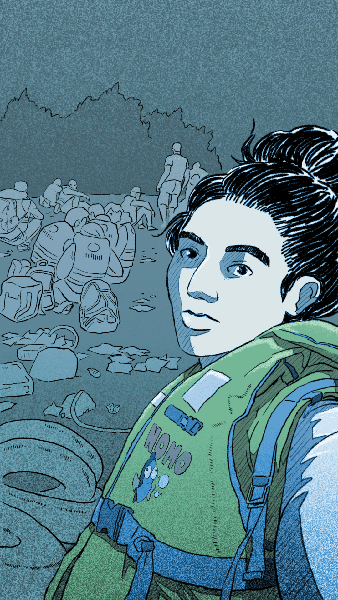
March 2017
We now have a really decent prototype, with more features coded and around 20% of the game’s content integrated. The interface designed by Figs is really neat, and the story flow feels good. Time to have Dana play it. We send her an .apk, and anxiously wait for her feedback over WhatsApp… And it’s very positive! She tells us she loved it. She played with her sister, who went full emotional and did not want to let Nour go at the end of the demo. This reaction is such a relief to me. It was very important to have Dana’s approval. I am aware she doesn’t account for every Syrian migrant there is, but she trusted us and helped us, and we really wanted to live up to this trust. So far, that seems to be the case!
~morale = morale+5
Another month, another rejection. This time, it’s from the great guys at Raw Fury. They were clearly interested in the game, but as they don’t do mobile-only projects, they had to pass. A shame, though, because I think working with them could have been really cool. Maybe next time! ~morale = morale-2
Being signed up for selection at AMAZE at least had a positive consequence: Chris Priestman gets in touch with us. This is really cool, because he’s a games journalist I love to read. We have a chat over email, and he writes this great piece on Waypoint. That’s BMML’s first press coverage, and it is not a small one! A few days later, I bump into a piece by Colin Campbell on Polygon, about a game that shares similarities with BMML. So I decide to go for it and @ him on Twitter… and he responds! A couple weeks & emails later, we’re on Polygon.
I guess the lesson here is: don’t be afraid to reach out to games journalists whose work you appreciate. Of course we know that press coverage is of the essence, so we’re basically through the roof!
~morale = morale+4
A quick selection of question Dana answered via WhatsApp over the course of the last few weeks:
Do young Syrians send each other sexy pics?
If you get random checked by soldiers around Aleppo, what do you do?



































